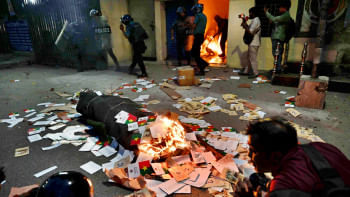Money hardly whitens
The demand for black money remains high in the property market, and the proposed amnesty on undisclosed money in the real estate sector will indeed generate more illegal wealth.
An investigation by The Daily Star has found that sellers generate black money when they sell property, and buyers show a much lower value of property during registration to evade tax, which eventually creates illegal money.
Take the following three cases into account to get an idea of the matter.
A person bought a 1,262-square-feet flat in an apartment block named Cordial Samela for Tk 27 lakh in south Badda last year. The person showed the price of flat around Tk 2,000 per square feet, whereas the actual price is Tk 6,000 to Tk 8,000 per square feet depending on location in the area.
Sagufta NM Housing Ltd that has a housing project in Badda said it was charging Tk 90 lakh for a 1,335-square-feet flat at a rate of Tk 7,000 a square feet. If the price of the Cordial Samela flat is assumed at Tk 6,000 per square feet, the flat would cost more than Tk 75 lakh. So, the sale of the flat generated black money of at least Tk 48 lakh.
The second case involves a flat at Wireless Gate in Mohakhali area. Sanchari Housing sold a 950-square-feet flat for Tk 28.67 lakh at a rate of Tk 3,017 per square feet. But the actual price is no less than Tk 8,000 per square feet. This deal generated black money of nearly Tk 50 lakh.
The third case is about a plot of land developed by Eastern Housing Ltd at Meradia. The sale price of a 2.5-katha (4.12 decimal) plot was shown at Tk 10.50 lakh, whereas its actual price is at least Tk 40 lakh. So, around Tk 30 lakh of illegal money was generated through the deal.
Real Estate and Housing Association of Bangladesh said it has around 20,000 unsold flats right now. If the purchase and sale of a flat generates at least Tk 20 lakh in black or untaxed money, the total amount would be a whopping Tk 4,000 crore.
“Everyone hides the actual price of property during registration to evade tax. Government revenue from land tax would be 10 times higher if the actual price of property were taken into account,” an official of Tejgaon Land Office told The Daily Star, asking not to be named.
Though successive governments have given amnesty on black money since the country's liberation, the facility failed to generate substantial revenues. According to National Board of Revenue data, a total of Tk 13,516 crore was whitened between 1971 and April 2013, and the government received only Tk 1,407 crore as tax.
It clearly shows the response had been poor, and the impact was not even marginal considering the presence of an enormous amount of black money -- not less than 40 percent (Tk 415,194 crore) of the country's GDP, according to the finance minister's post budget briefing on Friday.
Black money is usually generated in certain sectors -- real estate, jewellery, financial market, public procurement, non-profit organisations, external trade, international transactions involving tax havens and the informal service sector.
Analysts said amnesty on black money in the real estate sector had not only generated more illegal wealth in the past, but also pushed up property prices over the years.
A flat, which would cost between Tk 32 lakh and Tk 35 lakh eight years ago, now has a price tag of more than Tk 2 crore, Mubasshar Hussein, president of the Institute of Architects Bangladesh, told The Daily Star.
“The prices of construction materials did not show any significant increase. So, the reasons for the phenomenal rise in flat prices are the skyrocketing prices of land and the injection of black money into the real estate sector,” he said.
Ahsan H Mansur, executive director of Policy Research Institute, believes the government will not get a substantial amount of tax through the amnesty on black money in the real estate sector, The move will instead generate more black money in the economy.
He suggested introducing capital gains tax to prevent tax evasion and under-pricing of property values.
“Introduction of capital gains tax can stop the under-pricing of property values and accordingly, generation of black money will go down,” said Mansur, who is a former top International Monetary Fund official.


 For all latest news, follow The Daily Star's Google News channel.
For all latest news, follow The Daily Star's Google News channel. 



Comments